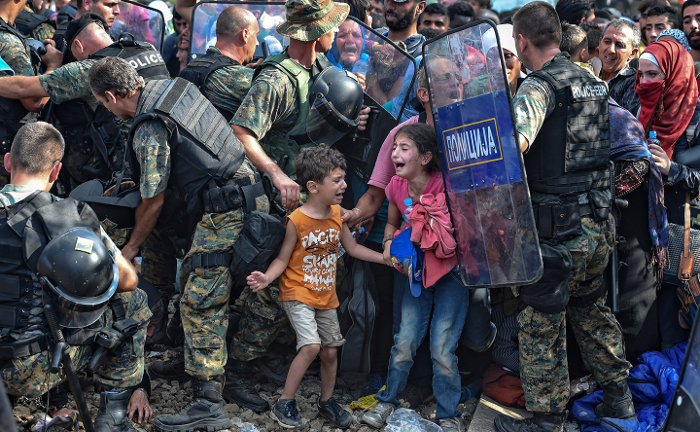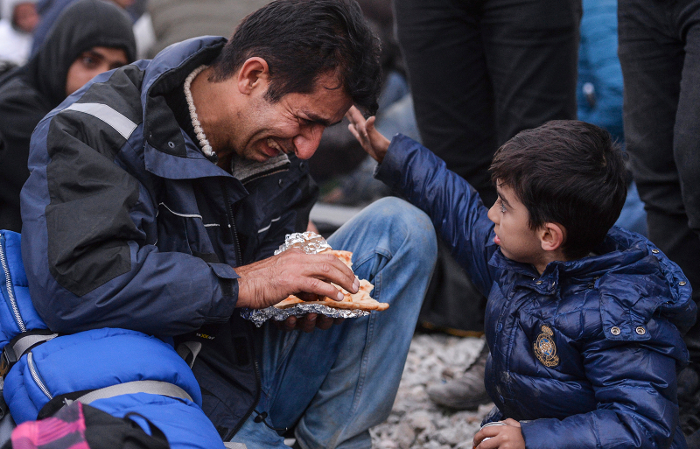Centre Cultural La Nau, Sala Oberta and Claustre
|
Opening Hours:
|
Tuesday through Friday, from 10:00 to 14:00 and from 16:00 to 20:00.
Sundays and public holidays, from 10:00 to 14:00. Closed on Mondays.
AUGUST: From Tuesday to Sunday, from 10:00 to 14:00. Closed on Mondays.
|
| Free entry |
 |
|
This picture has been chosen by UNICEF as 2015 Photo of the Year. © Georgi Licovsky
|
|
Organised by:
|
Photon Festival
Centre Cultural La Nau de la Universitat de València
|
|
Sponsors:
|
Fundación Cañada Blanch
Olleros Abogados
|
|
Collaborates:
|
Fujifilm
La Imprenta
Ideal Room
|
|
Curator:
|
Tania Castro
|
 |
| © Georgi Licovsky |
Leave immediately. A blanket, a backpack, some savings, some clothes. Fill your pockets with memories, the lightest ones. Take the kid from the crib without knowing when you will be able to feed him again. Close your home’s door for the last time. Put him on a boat or a train clung to the hope of being taken somewhere where life does exist. Knowing he will die because of the bombs, hope is shaped as a doubt: will he get to see the other side? The other side of the fences.
Welcome_14_low.jpg) |
| © Marko Risovik |
Welcome_15_low.jpg) |
| © Marko Risovik |
Georgi Licovsky's BIO
1964. Bitola, Macedònia
My beginnings are linked to wedding photography, which was very profitable, but after a short period, I decided to try photojournalism as I considered it an attractive challenge for me.
The departure of Yugoslavian soldiers from Macedonian territory caused great tensions and the war could be felt in the air. I was one of the few people taking pictures of the YPA (Yugoslav National Army). This event changed my career forever after meeting photographers from agencies EPA and AFT in search of images.
The following was the war in Macedonia in 2001, very emotive for me, but I already had enough experience and my own point of view as a photographer, so I could face all the challenges during the conflict. From a professional point of view, I did well, but I was emotionally devastated.
I soon started to be a part of EPA’s team of sports photographers, so I started travelling around the world covering European football, basketball and handball championships. It was there were I found the real reason for my career: taking pictures of young, happy and healthy people. There was no violence, everything was organised, had controlled conditions and my pictures were widely published in the media. I kept on coveringnews, but behind the media, I just covered everything which was going on in Macedonia and its surroundings.
Since April this year, I found myself with a new good story, that of the immigrants crossing Macedonia in search of a better life. European and American media did not pay much attention to this; my heart and soul were devastated when seeing another Exodus. As time went by, the story kept on growing, the images kept on becoming more startling, the interest kept on growing. At this point, I did not care much about the news shared in the world’s most important media; they were not as important as capturing and showing human suffering, those people’s suffering and showing the world how horrible these events were. My objective was to help people people with my daily deliveries on what was happening, in order to raise consciousness of powerful men by showing the explicit, that which reflects the real daily struggle of refugees seeking for a better life.
Time will say if we were successful on our efforts, not only to inform, but also to help.
Marko Risovik's BIO
Marko felt attracted to photography for the first time during his youth. After years experimenting, he discovered the narrative power of photography as a socially-engaged communication language. During six years, he worked as a graphic journalist in different media in Serbia. Recently, he changed his interest for long-term projects for aspects of social reality. World Press Photo selected him to participate in a master’s class for young photographers in South East Europe in 2010. His work received recognition of important organisation. Some of these awards are the following: Press Photo Serbia - Photo of the year 2012, followed by other six Press Photo Serbia wards in different categories between 2010 and 2013, Status magazine award for best photography in Serbian media in 2010, Beta photo agency special award for sports... Marko's work was published in different regional and international magazines and web editions, and presented in over fifty exhibitions. He is regular contributor to National Geographic Serbia magazine.











